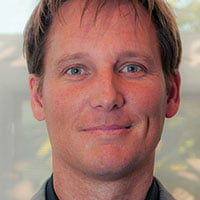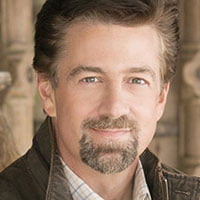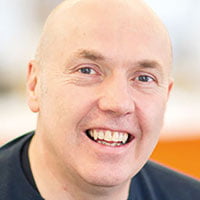Flyover states
Posted By Clive Whittingham On 21-04-2017 @ 2:35 pm In Features | Comments Disabled
Does the TV business’s shock at political events such as Donald Trump’s election victory suggest an industry out of touch with its audience? Clive Whittingham reports.

Brant Pinvidic
2016 has been labelled as the year of the shock political result – Donald Trump becoming US president, the UK leaving the European Union – and few industries seemed quite as shocked as TV. Which begs the question: is TV out of touch with a large proportion of its audience?
It has long been a criticism that television is too focused on London, New York and LA. The industry ‘circuit’ compounds this as execs attend the same events in the same cities to see mostly the same faces on an annual basis. And it leads inevitably to the fear that we’re all floating around in a bubble of our own making.
The idea that a ‘forgotten audience’ may be a big programming opportunity for 2017 was kicked off by Channing Dungey, president of entertainment at US network ABC, speaking [1] at C21’s Content London event at the end of last year.
Dungey said: “With our dramas, we have a lot of shows that feature very well-to-do, well-educated people who are driving very nice cars and living in extremely nice places. There is definitely still room for that, because wish fulfilment is a critical part of what we do. But in recent history we haven’t paid enough attention to some of the true realities of what life is like for everyday Americans.”
For veteran producer Brant Pinvidic, formerly president of Eyeworks USA and now CEO of Invelop Entertainment, the Trump election highlighted a clear problem. “If anybody thinks this is the first indication we exist in a media bubble, they haven’t been paying attention,” he says [2].
“If you look at the number of shows the industry puts on air and the number of them that succeed the only conclusion is we have no idea what we’re doing. We’ve got the smartest people who study this world with researchers, focus groups, people paid millions a year to programme networks, and their ratio of getting a hit is something like one in 10.

Fixer Upper on HGTV plays well in middle America
“When Trump won I thought, ‘Wow I have no idea what the audience my entire career and livelihood and family depends on thinks or values or does.’”
One broadcaster that has enjoyed ratings success in an era of declining cable subscriptions is Scripps Networks Interactive, which airs series such as Fixer Upper on HGTV that plays well in middle America. John Feld, Scripps’ senior VP of programming for HGTV, DIY Network and Great American Country, jokes that he mistook the presidential election map for his channels’ ‘time spent viewing’ map.
Scripps itself is headquartered in Knoxville and Feld says: “We work with a lot of urban-based prodcos who get us and our audience, but sometimes when I see them depict our cities it’s a depiction that will appeal to their urban viewers. When they shoot in Nashville, Denver, Atlanta, they’re not appealing to the people who live there as much as the viewers in New York and LA.”
Chris Dorsey founded his prodco Orion Entertainment in his home city of Denver, Colorado. “As a mid-westerner, in my opinion there are definitely two Americas. There’s a different world view that exists in small-town and rural America to that in urban centres. When you look at a political map, the country is all red except for the urban centres, and it’s a very different socio-economic situation in those urban centres.
“As producers, it’s about how we create programming for that 40% of the country that lives in small towns or rural America.”

Chris Dorsey
One of the problems in attempting to do that without being based there is, according to both Feld and Dorsey [2], the tendency towards extreme caricatures.
“One of the problems with the industry is you need 17 versions of whatever hits,” Feld explains. “Four years ago everybody was asking, ‘Where is our Duck Dynasty?’ Now it’s ‘Where is our Fixer Upper?’ Everybody chases the same thing. The only people outside of that who end up on TV are crazy personifications – the Honey Boo Boo’s of this world. So you either get totally bizarre or 85 of exactly the same thing.”
Dorsey adds: “Authenticity is often talked about and seldom achieved. When somebody has a preconceived notion about a person who does a certain type of job, lives in a certain type of place, they come with inherent bias. Too many execs try to play to that stereotype.
“The challenge is how do we make content that doesn’t make caricatures, but finds good characters? Even people in the city know when they see a show on some guy that lives in the woods and think, ‘Who’s this strange creature?’, it doesn’t ring true. How do we really get authentic? How do we show the real world of jobs and lifestyles?”
Jeff Collins, founder of Dance Moms and Stove Tots producer Collins Avenue, is another who agrees the industry exists in a media bubble. “Is there a segment of the population that we have been missing? I believe there is,” he says [3].

Stove Tots from Collins Avenue
“I grew up in the South, in a red state that went for Trump. I grew up around working class folks who don’t have a college education. What do those folks want to see on television? They want to see stories about people like them, who win.
“A channel like History has always been keen to tell stories about men who, by the sweat of their brow, go into the wilderness and scratch out a living that doesn’t involve being part of the system. That’s worked well for a male demographic that wants to come home at the end of the day and fantasise about not having a job where somebody is breathing down your neck. Well, we’ve done that, we’ve had that fantasy, how do we bring that home? How do we find stories about guys who are part of the system, who aren’t living in Alaska, but who are winning? That will be the trend for 2017.”
Undoubtedly, the issue of where the majority of the industry is located is key to the whole debate. In the US, the attitude that you have to be on the east or west coast to succeed in the game is starting to soften.

HGTV’s Listed Sisters
“It was tough on the network side to get good programming executives to come to Knoxville for a long time,” Feld admits. “Representation in New York and LA was important, but Vimeo Link changed all of that. If you can send me your show on that from Juneau, Alaska, then I don’t need people in New York or LA any more. When I started five years ago we had nine or 10 execs in New York and four or five in Knoxville. Now we have 15 in Knoxville and three or four in New York.”
Scripps moved its Travel Channel execs from Washington DC to Tennessee and is already reaping the benefits, according to Feld. “Four of our six networks are in the same building, so I can say to another channel exec ‘This idea wasn’t right for me but maybe you can take a look at it.’ I might not have picked up the phone and told New York or DC about that opportunity, I’m more likely to do it if the office is next door.”
It’s a similar story in production. Jeff Keane founded Coolfire Studios in St Louis in 2002 and has since produced series including Welcome to Sweetie Pies for OWN and another HGTV success, Listed Sisters.

Travel Channel’s Bizarre Food
“One of the biggest challenges was recruiting and retaining talent,” Keane says. “Initially, we made use of the commercial and advertising production community in St Louis. These people had the core capabilities, we just needed to retrain them. But we get calls on a daily basis now from people in New York and LA who say they want to come back home – they’re getting married, they’re having kids, they want to be close to their family again. Previously there was nothing in St Louis for them, now we’re an option and we’re snatching up those people.”
That’s a scenario also playing out at Tremendous Entertainment in Minneapolis, which has made Rock the Park for ABC and Andrew Zimmern-fronted food shows Bizarre Foods and Delicious Destinations for Travel Channel.
The company’s chief operating officer and VP Jane Durkee says: “We get calls from people all the time, from crew and talent that have worked in New York and LA and want to come home. Raising a family in the twin city area is much more appealing and it’s a competitive advantage for us.”
In the UK, despite BBC and Channel 4 having public service broadcast commitments to the ‘nations and regions,’ and the latter currently consulting on a possible move from West London to Birmingham, there remain huge British cities without prodcos at all.
Andrew Sheldon, creative director and founder of Sky-owned True North in Leeds, says: “The Brexit result raised a lot of questions for the country, but specifically for our industry. We need to find ways of reflecting what people outside the metropolitan bubble think.

Andrew Sheldon
“One of the keys is production genuinely being based outside London. If you go to Newcastle, there is no factual television production at all, and that’s disgraceful. It’s a vibrant, successful, cultural city that is only represented on television by girls staggering around drunk or Newcastle United fans at the football. It’s the same right down the east coast – Hull, Sheffield, Nottingham, Leicester, none of these places have any meaningful television production, so the views of those places aren’t reflected on screen.
“If you’re a 21-year-old with a degree in film and television and you live in those cities, you’ve got to travel long distances just to do work experience to try and get your career up on its feet. People waiting tables and renting a flat have no chance unless their parents can support them. People who have a lot to offer the industry are disenfranchised right at the start of the process.”
There is a school of thought that argues US TV programmed for the Trump voter too well. Jago Lee, who founded production outfit Nerd before he joined Canada’s Blue Ant Media as creative director, says: “There was, for a time, a whole subset of US cable TV that painted a catastrophic picture of the US. I think it empowered Trump to be able to point to a version of the US that actually only exists in the most extreme versions of reality TV – an apocalyptic, confrontational, pugilistic middle America.
“There was an assumption the audience would know it wasn’t real, that it was constructed for entertainment, but I’m not sure that’s true. I don’t think that TV exists any more. We talk about authenticity now; cable has gone away from the extreme characters, but it’s too late vis-a-vis Trump.”

Sam Barcroft
Sam Barcroft, founder of London-based digital specialist Barcroft Media, says while it is true most of the production industry is in metropolitan cities, he doesn’t necessarily believe it is out of touch. “As journalists or broadcasters we rely on information and the information from pollsters was that Brexit and Trump were unlikely to win. It wasn’t disregard, it was evidence,” he says.
“That said, as an industry we could do more to engage people who don’t share the views of people who live in cities. Channel 5 has done this particularly well in the UK – it has subjects others find hard to do, looking at a slightly poorer and less metropolitan audience. I don’t know whether other networks want to risk their own audiences by moving commissioning towards that.”
Jonathan Hewes, CEO of Tinopolis-owned Mentorn Media, says: “Trump actually got fewer votes than Hillary Clinton, so it’s not like 85% of the population were suddenly discovered voting for Trump and we never realised.
“In the UK, nobody expected the Brexit vote to go the way it did, but it wasn’t 80/20, it was a relatively small number of the total population that voted for it. London is this black hole which sucks everything into it and if you have everything there it’s an issue for the country and a challenge for TV, but we do a lot for Channel 5, which is predominantly a northern audience.”
Dan Whitehead, head of drama and digital at TV analysts K7 Media, says: “I would be wary of making any kneejerk reactions based on the twin upsets of Brexit and Trump.
“Certainly, the media should take a long look at its coverage of issues surrounding immigration and benefits, and ponder how much of its tone was an accurate reflection of reality and how much that tone may, in turn, have reinforced messages coming from more ideological corners. But I don’t see much evidence for the idea that there is a mass audience that has been ‘forgotten.’
“For one, that notion falls into an unhelpful, divisive rhetoric that positions Brexit and Trump voters as some kind of ‘other,’ a seething mass of working-class resentment that we might have diverted had we only looked beyond our ivory towers and produced more programming that pandered to what we imagine are their views.
“I look over the factual output of the US and UK over the last year or so and see plenty of shows pitched at that assumed audience. They were clearly not forgotten, but maybe there was some naivety in thinking unscripted TV could ride the populist wave of tabloid reportage in search of ratings without getting its own hands dirty.
“We could argue back and forth for years over who caused what in politics in 2016, and if TV’s ‘liberal bubble’ meant we missed the warning signs, but my big worry is of an equally damaging over-correction in the opposite direction.”
As with everything, the situation probably isn’t as extreme as it seems. But the political results, and our industry’s surprise at them, further highlighted a problem we already knew existed: production companies and broadcasters are too tightly clustered together and the people they hire often require backing to break into the business. This excludes potentially talented people and important voices from poorer backgrounds or distant geographical locations.
Break that and you might find, as Scripps in the US and Channel 5 in the UK have done, that yours are the channels most capable of bucking the overall decline in linear TV ratings.
Article printed from C21Media: https://www.c21media.net
URL to article: https://www.c21media.net/flyover-states/
URLs in this post:
[1] speaking: https://www.c21media.net/channings-changes/
[2] he says: https://www.c21media.net/screenings/c21tv/capitol-ideas
[3] he says: https://www.c21media.net/dance-to-a-new-tune/
Click here to print.